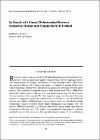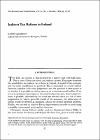Browsing The Economic and Social Review, Vol. 21, No. 1, October, 1989 by Title
Now showing items 1-13 of 13
-
Determinants of money demand in Ireland 1971 to 1988: rounding-up the usual suspects
(Economic & Social Studies, Dublin, 1989)Unless some form of stable relationship between money demand and economic activity exists, there is no possibility of the monetary authorities being able to affect economic activity by changing the money supply. This fact, ... -
Economic theory and econometric models
(Economic & Social Studies, Dublin, 1989)The constitution of the Econometric Society states as the main objective of the society "the unification of the theoretical-qualitative and the empirical-quantitative approach to economic problems" (Ragnar Frisch, 1933, ... -
In search of a causal relationship between industrial output and employment in Ireland
(Economic & Social Studies, Dublin, 1989)Recently, many analysts of the Irish manufacturing sector have been concerned with an apparent negative relationship, between aggregate industrial employment and output in Ireland, that has developed since 1980. Over the ... -
In search of a causal relationship between industrial output and employment in Ireland: a comment
(Economic & Social Studies, Dublin, 1989)John Fell has produced a stimulating paper which uses V A R methodology to address the issue of causal relationships between employment and output at both aggregate and disaggregated levels. Given the techniques employed, ... -
Indirect tax reform in Ireland
(Economic & Social Studies, Dublin, 1989)The Irish tax system is characterised by a narrow base with high rates. This is true of both the direct and indirect system. This paper examines the possibilities for indirect tax reform in Ireland. A model of the economy ... -
Indirect tax reform in Ireland: a comment
(Economic & Social Studies, Dublin, 1989)This paper essentially applies Irish data to the model developed by Ahmad and Stern. It poses three interesting questions. (i) Can we find a tax change which will. increase welfare, holding total revenue constant? (ii) ... -
Inferring long-run supply elasticities from a short-run variable-revenue function
(Economic & Social Studies, Dublin, 1989)Recent papers by Kulatilaka (1987, 1985) Squires (1987) and Hertel (1987), using the seminal exposition of Brown and Christensen (1981), which in turn is heavily derivative of the work of Lau (1976, 1978), have emphasised ... -
Irish migration: the search for the efficiency and equity basis of a European regional policy
(Economic & Social Studies, Dublin, 1989)In the US and Canada a federal system of government is used, i.e., there exist a number of tiers of government with different functions assigned to each level. Government intervention in these countries, as in many other ... -
Irish migration: the search for the efficiency and equity basis of a European regional policy: a comment
(Economic & Social Studies, Dublin, 1989)This paper focuses on aspects of migration which have received limited attention in the Irish literature. The latter has by and large been concerned with the causes of migration, to the near exclusion of its consequences ... -
Payroll taxes, capital grants and Irish unemployment: a comment
(Economic & Social Studies, Dublin, 1989)In this paper Frank Barry examines the issue of the appropriateness of capital versus labour subsidies in the Irish economy, in the context of three different models, namely a neo-classical small-open-economy model, a ... -
Payroll taxes: capital grants and Irish unemployment
(Economic & Social Studies, Dublin, 1989)A recent OECD study concluded that no other member country had a tax/subsidy system as biased against the use of labour as the Irish. This view of the flawed nature of the Irish system has, however, been disputed by many ... -
The real wage gap and its development over time: the Irish experience 1960-1987
(Economic & Social Studies, Dublin, 1989)The high inflation and high unemployment occurring throughout the OECD in recent years have resulted from a complex interaction of contractionary supply and demand factors as outlined by Bruno and Sachs (1985). Their ... -
The real wage gap and its development over time: the Irish experience 1960-87: a comment
(Economic & Social Studies, Dublin, 1989)I wish to make a number of points regarding the content of the paper on the wage gap presented by Walsh, Walsh and Woelger. Let me first of all state that I found the explanation given in the paper to be a very simple and ...
















